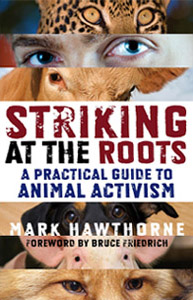Please Note: With this edition of Activism Updates, I'm relinquishing the illusion of a schedule for the series, since it's become abundantly clear to me that I haven't the time to stick to it. Worse, I've stopped actually reading the activism e-mails that come to me from various sources; I drop them in a folder for later perusal, thinking I might use them in the blog series, and then never return to them. So I've actually become a less-effective activist than I was when I began, and that's problematic for me. I've also noticed an uptick in the number of activism posts from friends in my social networking feeds, which seems to indicate an increasing level of comfort among my peers for this sort of material, so I'm less worried about the spamming issue.
What this means is that the Activism Updates series will remain the same in terms of content but become less frequent. I'll post a book review when I have one, offer the space to other activists who have interesting things to say, cover local organizations and issues as necessary and address larger national and global concerns from time to time. I'll also be linking in my social networking feeds to articles of interest and opportunities for activism that rise above the slacktivism bar for me and present authentic opportunities for engagement.
That's it for now. On to the book review, and thank you for reading.
 In this edition of Activism Updates, I'm reviewing Mark Hawthorne's book Striking at the Roots: A Practical Guide to Animal Activism. Hawthorne is a longtime animal advocate who has engaged in many models of activism and who volunteers for several non-profit organizations. He brings this expertise to an informative survey of animal activism methodologies, and while his prose is often dry, he makes up for it in the sheer volume of salient information he imparts.
In this edition of Activism Updates, I'm reviewing Mark Hawthorne's book Striking at the Roots: A Practical Guide to Animal Activism. Hawthorne is a longtime animal advocate who has engaged in many models of activism and who volunteers for several non-profit organizations. He brings this expertise to an informative survey of animal activism methodologies, and while his prose is often dry, he makes up for it in the sheer volume of salient information he imparts.
From leafleting to animal liberation, Hawthorne provides examples of activism in each model. Chapters open with stories that illustrate the topics under discussion and follow with interviews, information and advice for prospective activists. His approach empowers people who want to act but might not know where to begin with a diverse tool kit that includes techniques for Internet outreach, writing articles and letters to the editor, running an effective table, corporate campaigning, government lobbying, protesting and of course, direct action animal liberation. Hawthorne also explores various pitfalls encountered while engaging in these activities. For instance, in "Animal Tracts: Leafleting" he offers the following counsel to leafleters who encounter negative responses and rude people:
"Some might make a nasty or belittling comment, but those who do are a very small minority. Leafleting is a statistics game - if you give out X amount of booklets, you're most likely going to reach many receptive individuals and help animals significantly...One thing that animal advocates have on our side is a sense of compassion and kindness. Responding to nasty comments with kindness presents us with a great opportunity to make people think; frequently individuals who make a rude comment at first will come up later, apologize and ask for a booklet."
Hawthorne also discusses the personal and emotional needs of animal advocates. He believes that individual people can make a difference and provides ample evidence of this in the advocates he profiles. He encourages the cultivation of coping strategies for dealing with guilt, stress and burnout. He also understands that not every model of activism is suitable for every person. Of animal liberation, he writes:
"It is important that you understand that many direct actions against animal exploiters are considered illegal and should be undertaken with the knowledge that you could be arrested and go to jail, even if you are acting on ethical grounds, such as offering your home to a hen rescued from a battery shed. Other direct actions, including investigative work to document abusive practices, though legal, are likely to prove both upsetting and nerve-wracking."
In all, Striking at the Roots is a comprehensive field guide full of success stories, practical advice and support for current and would-be activists that need not be read front to back and can be utilized as a roadmap for activism beyond animal advocacy. If you're thinking about acting upon the dictates of your conscience, and you're wondering where to begin, read this book first.
You can find Mark Hawthorne on the Internet here: http://www.strikingattheroots.com.
